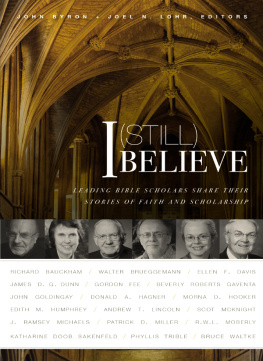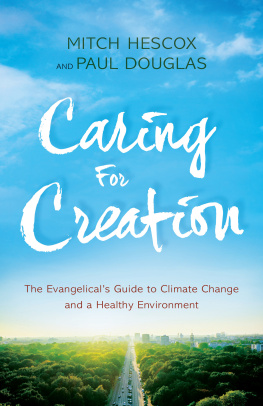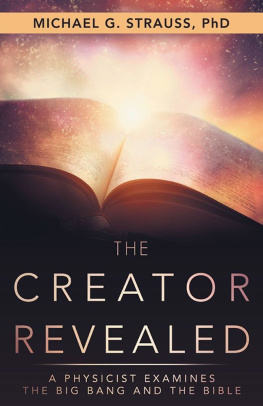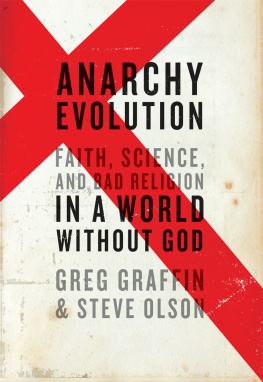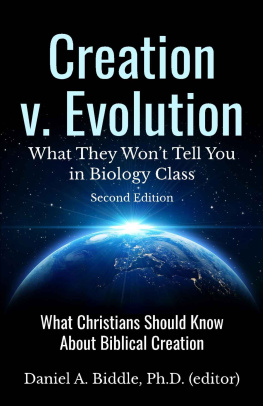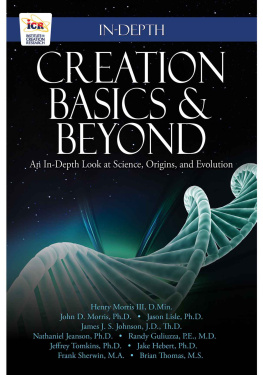This collection of firsthand experiences is important for showing that firm belief in the truth-telling character of Scripture can support, rather than undermine, the best scientific investigations. It also provides more solid evidence for the good that BioLogos is doing to transform science and religion from a war zone to an instructive conversation.
Mark Noll, Francis A. McAnaney Professor of History, University of Notre Dame
This book captures the convictions and stories of an array of Christians whose scholarship, reflection, faith and community have brought them to affirm Gods use of evolution in the processes of creation. Consider their stories. Ponder their convictions. May your journey too be one that fully opens to worshipful wonder and to scientific discovery.
Mark Labberton, president, professor of preaching, Fuller Theological Seminary, author of Called
While very few people seem to care about science as a philosophical construct, many people care about how scientific findings impact their understanding of life, love, meaning and faith. No scientific concept draws us into these contemplations more than evolution, which leads us to ask big questions about our nature and Gods. This book should be embraced as a treasure. In it you will find unique minds wrestling with how we got here and what our evolutionary history has to do with God, the Bible and the depth of our lived experience. I promise this book will challenge you on nearly every page as you discover new insight after new insight.
Andrew Root, Olson Baalson Associate Professor of Youth and Family Ministry, Luther Seminary, principal leader, Science for Youth Ministry
Atheists often cite religious opposition to evolution as a reason for their unbelief. This wonderful collection of essays by Bible-believing Christians demonstrates how unnecessary it is to oppose evolution in the name of faith. What is striking about the authors in this volume is the sheer range and diversity of their own spiritual journeys in coming to terms with science. It is my prayer that evolution might cease to be seen as a threat to faith on the part of some Christians rather than as an integral aspect of Gods created order for which the Christian can rightly give praise.
Denis R. Alexander, emeritus director, The Faraday Institute for Science and Religion
If we want to converse with someone, we must first be willing to listen, to understand. And these stories are easy to listen toso well written, so personally engaging, so reflective of committed faith. You will find yourself liking the contributors as you get a glimpse into their thought processes. As someone who studies and ministers in the area of faith and science, I commend the authors and editors for this nicely done book.
C. John Jack Collins, professor of Old Testament, Covenant Theological Seminary
The conflict between Christian faith and science is long-standing and significant, and no issue has been more central to this perceived tension than evolution. In this welcome collection of essays, leading Christian thinkers explain their reasons for affirming evolution while remaining committed to their faith. It is to be hoped that this volume will find a wide readership, especially among those who struggle to relate their faith to the consensual canons of science.
John R. Franke, theologian in residence, Second Presbyterian Church, Indianapolis
Text copyright 2016 Kathryn Applegate, James Stump
and BioLogos Foundation
This edition copyright 2016 Lion Hudson
The right of Kathryn Applegate, James Stump and Biologos Foundation to be identified as the authors of this work has been asserted by them in accordance with the Copyright, Designs and Patents Act 1988.
All rights reserved. No part of this publication may be reproduced or transmitted in any form or by any means, electronic or mechanical, including photocopy, recording, or any information storage and retrieval system, without permission in writing from the publisher.
This edition published by Monarch Books
an imprint of
Lion Hudson plc
Wilkinson House, Jordan Hill Road,
Oxford OX2 8DR, England
Email: monarch@lionhudson.com
www.lionhudson.com/monarch
ISBN 978 0 85721 787 5
e-ISBN 978 0 85721 788 2
First edition published in the United States by InterVarsity Press
Acknowledgments
All scripture quotations, unless otherwise indicated, are taken from The Holy Bible, New International Version, NIV Copyright 1973, 1978, 1984, 2011 by Biblica, Inc. Used by permission. All rights reserved worldwide.
Cover image copyright Getty
A catalogue record for this book is available from the British Library
This book is lovingly dedicated to our children
Kathryns Lucy and Josiah,
and Jims Casey, Trevor and Connor
in the hope that their generation will never be
forced to choose between faith and science.
Contents
Kathryn Applegate and J. B. (Jim) Stump
James K. A. Smith
Scot McKnight
Ken Fong
Deborah Haarsma
Tremper Longman III
Jeff Hardin
Stephen Ashley Blake
Francis S. Collins
Oliver D. Crisp
Jennifer Wiseman
John Ortberg
Dennis R. Venema
Praveen Sethupathy
Dorothy Boorse
J. B. (Jim) Stump
Daniel M. Harrell
N. T. Wright
Justin L. Barrett
Denis O. Lamoureux
Laura Truax
Rodney J. Scott
Amos Yong
Richard Dahlstrom
Kathryn Applegate
Richard J. Mouw
Foreword
Denis Alexander

Minutes before starting to write this Foreword, I heard of a biology student from a well-known university who took his own life because he could not reconcile the anti-evolution stance of his fundamentalist church with the overwhelming evidence for evolution that he was hearing every day in his course.
Such tragic examples are thankfully rare. Yet the experience of cognitive dissonance that some feel as their beliefs about creation are threatened by the reality of evolutionary history is all too common in certain segments of the Christian community. Atheists, also, often cite religious opposition to evolution as a reason for their unbelief. This wonderful collection of essays by Bible-believing Christians demonstrates how unnecessary it is to oppose evolution in the name of faith.
What is striking about the authors in this volume is the sheer range and diversity of their own spiritual journeys in coming to terms with science. Yet all are agreed that what scientists do is to explore Gods creation, for all that exists has its source in Him, not the distant deistic God who establishes the laws of science and then has nothing more to do with the universe once created, but the one by whom and in whom all things continue to exist at every moment. It is no accident that theologians at the time of Darwin welcomed his theory because they understood that it was more consistent with the involved biblical God who is the on-going author of creation, rather than the cold rationalistic God of the deists.
Our identity as Christians, as Kathryn Applegate expresses it so well in the present volume, is in Christ not in evolution. It is my prayer that evolution might cease to be seen as a threat to faith on the part of some Christians, rather being seen as an integral aspect of Gods created order for which the Christian can rightly give praise.
Acknowledgments

The concept for this book originated in 2011, when philosopher and theologian Thomas J. Oord proposed it to the leaders of BioLogos and a publisher, Mark Russell. The original plan was to collect between fifty and sixty short essays by evangelicals who accept evolution, something Tom later accomplished (entirely within his own denomination!) in his book with Sherri B. Walker, Nazarenes Exploring Evolution (SacraSage Press, 2013). Later, and in consultation with InterVarsity Press (IVP), we decided to feature half the number of essays but allow the authors more space to share their often-complex journeys toward reconciliation between the Bible and evolutionary science. We are indebted to Tom and Mark, as well as to then-president of BioLogos, Darrel R. Falk, for their early work and ongoing support of the project.
Next page

